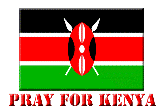Martha Karua expressed her anger over comments that Kofi Annan made, hinting that both sides had agreed on a transitional government. She said this had never been discussed, and Kofi Annan had undermined the government's position at negotiations.
Kofi Annan has defused the row saying that his statement represented his perspective, and does not imply a formal agreement between the two parties.
Graca Machel has said only a political solution can haul Kenya out of this crisis. She said that Parliament must lead the process by passing reforms that will lay the foundation for lasting peace.
Muthoni Wanyeki has also pinpointed some reforms to resolve the crisis.
In the meantime a diplomat talks about the tribal divide reaching the police force.
Analysts say Kibaki has been reluctant to use the military more fully to stop the violence because he is worried about losing control over it. He has also become alarmed by divisions in the police force, according to one high-ranking Kenyan diplomat with close ties to the country's security apparatus. A recent transfer of police commanders in western Kenya was intended to rid the force of Kalenjin officers whose loyalty to Kibaki was in doubt, the diplomat said.
It is no longer a national police force, or even a national armed force," he said on condition of anonymity because of his involvement in ongoing negotiations between the two sides. "It is skewed in terms of composition and command."
Analysts say the military and the security forces -- which include the police and a paramilitary force known as the General Service Unit, or GSU -- became heavily politicized when Kibaki took office in 2002. Both forces had previously recruited according to census. But Kibaki's government drew heavily from his own ethnic group and began placing Kikuyus in high-ranking positions, causing some resentment among the rank and file.
Many Kenyans had treated the police who patrolled their communities like neighbors, but that trust has nearly disappeared.
Quotes from Kenyans say tribal divide has reached police force by Stephani McCrummen of the Washington Post.
Karuti Kanyinga a senior research fellow explains why analysts have concluded that the December 's presidential election was rigged. He says The bottom line is that this election was fraudulent... that this election appears to have been rigged in favor of a certain presidential candidate, and all evidence seems to point fingers to President Kibaki's strongholds.
Update
The noose is waiting to be put around the necks of individuals who sabotage ongoing talks for a political settlement out of crippling crisis, The Standard can report.
The United Kingdom and Switzerland once again demonstrated that the international community is in no mood to entertain failure by issuing the sternest warning yet, to personalities perceived as pushing sectarian instead of national interests.
In Nairobi, British High Commissioner Mr Adam Wood maintained that his government still did not recognise President Kibaki as legitimately elected.
"Our pledge is to recognise states not governments. This has also been expressed by other British ministers. But given the irregularities reported by observers around the presidential elections, we do not recognise the Kenyan Government as presently constituted as representing the will of Kenyan people," Wood said in an interview with our sister television station KTN.
Even more assertive was the position taken by Switzerland in the matter. "To ensure success, Switzerland urges all parties to remain fully committed to the negotiation process," a statement issued from the Swiss Embassy in Nairobi read.
"If the mediation efforts nevertheless fail to resolve the crisis, Switzerland would consider taking appropriate measures such as restricting access to its territory to individuals responsible for the failure of the process."
Quotes from Renewed pressure as saboteurs warned.
Hidden Truth Behind the Shocking Wave of Defections to UDA
-
What is the very sudden wave of defections to the UDA party (especially
from prominent Gachagua Mt Kenya politicians) all about? What is really
happening b...
20 hours ago





No comments:
Post a Comment